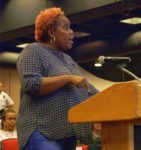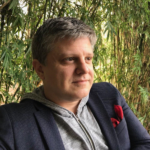Welcome to Making Meaning, a podcast that explores how and why the humanities are an essential part of our everyday lives. In this series, we hear stories from our nation’s humanities councils and leaders across the greater United States about the role the humanities have played during the pandemic and are playing in our recovery. Listen to the trailer in English and in Spanish translation. All episodes become available on Tuesday, November 9, 2021, wherever you receive your podcasts.
Ep. 3: Environmental Justice, Climate Disasters, and the Humanities
Adrienne Kennedy, a climate activist and organizer from south Lumberton, North Carolina, talks about what environmental justice looks like for her after Hurricane Matthew destroyed her home. Dr. Joseph Campana, director of the Center for Environmental Studies at Rice University, explores ways the humanities can help us process relentless patterns of climate catastrophe.
Guest Bios:
 Adrienne Kennedy is a mother of three from Robeson County. She is the community organizer for Seeds of H.O.P.E. Disaster Recovery Center, a non-profit community development organization (CDC). H.O.P.E. stands for “holding onto purpose every day.” Its mission is to invest and reinvest in Lumberton, NC during disaster and recovery. H.O.P.E. is on the move to enhance communities by creating employment, engaging in economic development projects, and providing educational and legal programs that will provide empowerment and sustainability for families. Its motto is “Building families stronger, not quicker, one family at a time.” The CDC maintains a disaster recovery center in Lumberton geared toward relief, response, rebuilding, recovery, and incident preparedness. Kennedy is currently working on a strategic plan for an economic development and solar incentive project for the community.
Adrienne Kennedy is a mother of three from Robeson County. She is the community organizer for Seeds of H.O.P.E. Disaster Recovery Center, a non-profit community development organization (CDC). H.O.P.E. stands for “holding onto purpose every day.” Its mission is to invest and reinvest in Lumberton, NC during disaster and recovery. H.O.P.E. is on the move to enhance communities by creating employment, engaging in economic development projects, and providing educational and legal programs that will provide empowerment and sustainability for families. Its motto is “Building families stronger, not quicker, one family at a time.” The CDC maintains a disaster recovery center in Lumberton geared toward relief, response, rebuilding, recovery, and incident preparedness. Kennedy is currently working on a strategic plan for an economic development and solar incentive project for the community.
Find out more about Seeds of H.O.P.E. Disaster Recovery Center and watch Robeson Rises, the film featuring Adrienne Kennedy’s story.
Read more about the North Carolina Humanities Watershed Moments initiative that screened the film as part of a touring discussion series, Revisioning Recovery: Films Uncovering the Roots of Disaster.
Watershed Moments includes the Smithsonian Institution Museum on Main Street Water/Ways traveling exhibition and is part of Democracy and the Informed Citizen initiative, which is generously funded by a grant from The Andrew W. Mellon Foundation.
 Joseph Campana is a poet, arts writer, and scholar of the literature and culture of Renaissance Europe, a time of climatic instability many refer to as the Little Ice Age. Recent projects consider early modern understandings of humanity, creaturely life, personhood, scale, affect, waste, and other concerns refracted through a range of arts and media, from poetry and theater to political theory and natural history. Often his work considers how traditionally literary or aesthetic categories like form, genre, and media‚ and histories of ecological concepts inform broader kinds of environmental thinking. Current projects include two monographs in progress, Living Figures: Life and its Forms in Early Modernity and Scales of Nature: Thinking with Bees in the Renaissance, a two-volume co-edited collection on Renaissance insect life called Lesser Living Creatures, and a collection of pastoral poems entitled Live Oak. His interests in the contemporary eco-arts has resulted in a collaboration with artists Marina Zurkow and Sarah Rothberg to create an open-access digital version of their Investing in Futures project, a constraint-based system to encourage speculation about futures. Campana serves as the William Shakespeare Professor of English, the Director of the Center for Environmental Studies, the co-director of the Environmental Studies curriculum, and a co-PI on the Mellon Foundation-funded Diluvial Houston grant.
Joseph Campana is a poet, arts writer, and scholar of the literature and culture of Renaissance Europe, a time of climatic instability many refer to as the Little Ice Age. Recent projects consider early modern understandings of humanity, creaturely life, personhood, scale, affect, waste, and other concerns refracted through a range of arts and media, from poetry and theater to political theory and natural history. Often his work considers how traditionally literary or aesthetic categories like form, genre, and media‚ and histories of ecological concepts inform broader kinds of environmental thinking. Current projects include two monographs in progress, Living Figures: Life and its Forms in Early Modernity and Scales of Nature: Thinking with Bees in the Renaissance, a two-volume co-edited collection on Renaissance insect life called Lesser Living Creatures, and a collection of pastoral poems entitled Live Oak. His interests in the contemporary eco-arts has resulted in a collaboration with artists Marina Zurkow and Sarah Rothberg to create an open-access digital version of their Investing in Futures project, a constraint-based system to encourage speculation about futures. Campana serves as the William Shakespeare Professor of English, the Director of the Center for Environmental Studies, the co-director of the Environmental Studies curriculum, and a co-PI on the Mellon Foundation-funded Diluvial Houston grant.
Learn more about the Center for Environmental Studies, the Investing in Futures project, and Dr. Joseph Campana’s work.
Statistics mentioned in this episode taken from:
US Census Bureau, Lumberton NC
Voices featured at the top of the show: Faith Seiuli (Intersections Inc, a Amerika Samoa Humanities Council-supported program), Stephanie Gibson (Nevada Humanities), Laura McGuinn (South Carolina Humanities), and Kevin Lindsey (Minnesota Humanities Center).
Find out more about environmental humanities on our blog:
One Librarian’s “Watershed Moments” During The Pandemic
Florida Humanities Navigates Sacred Waters
Water Storytelling with Utah Humanities
Water Futures with Wisconsin Humanities
Ethics and Ecosystems with Delaware Humanities
Chronic Catastrophe: A New Podcast from California Humanities Emerging Journalist Fellows
The show is produced by LWC. Elizabeth Nakano is our producer and sound designer. Jimmy Gutierrez edited the series. Jen Chien is executive editor. Cedric Wilson is lead producer. Spanish translations by Virginia Lora. You can find more episodes on Apple Podcasts, Spotify, or wherever you listen to your favorite podcasts.
Making Meaning is a podcast from the Federation of State Humanities Councils and is part of its “Humanities in American Life” initiative, which is generously funded by a grant from The Andrew W. Mellon Foundation.
Note: The opinions and ideas expressed in this episode are those of our guests and do not necessarily reflect those held by the Federation of State Humanities Councils or its funders.


